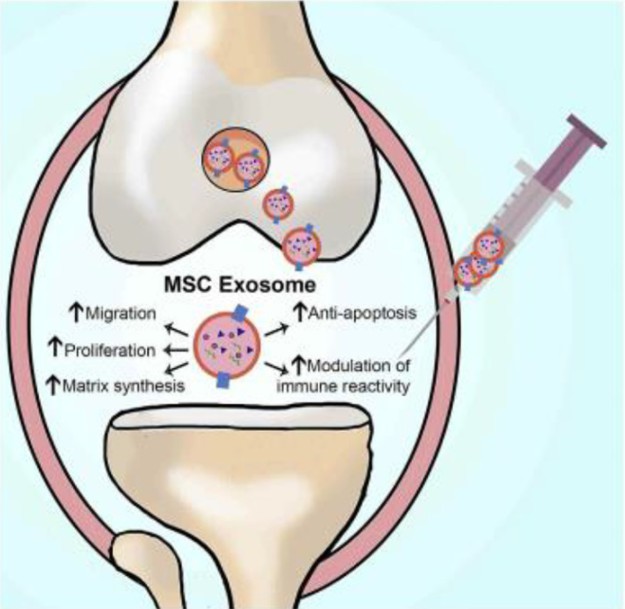Tissue Regeneration and Repair Exosome Research Solution
Online InquiryBy virtue of their bioactive cargo associated with key developmental morphogens and other signaling elements, exosomes play critical roles in mechanistic pathways in development, organogenesis, wound healing and regeneration. These extracellular vesicles (EVs) have inherent therapeutic potential. Exosomes from human mesenchymal stem cells (MSCs) have been utilized in tissue regenerative medicine and have shown positive therapeutic effects.
Exosomes in tissue regeneration and repair
Exosomes are nano-scale (typically~30-150 nm in diameter) extracellular vesicles (EVs) released by almost all cells. They are also effective transport vesicles that can carry protein content in their cores, as well as on the surface lipid layer, and also contain many types of genetic information, including messenger RNA (mRNA), DNA, and small noncoding RNAs. These EVs are involved in many biological processes, such as cellular communication, cell community life cycle and immune system regulation. In recent years, exosomes have attracted extensive attention and research in tissue regeneration and repair. They have been studied and used to effectively promote the repair of tissue or organ defects, including the liver, heart, and kidneys. Exosomes could modulate a series of processes, such as renal glycerol reperfusion, cardiovascular disease ischemia, or hepatic fibrosis through the delivery of nucleic RNAs, thus promoting the reconstruction and functional recovery of these organs. In addition, Exosomes have also been reported to play an important role in the repair activities associated with bone and cartilage through their actions on chondrocytes, osteoblasts, osteoclasts, precursor cells, and immune cells.
 Fig. 1 Therapeutic function of MSC exosomes on cartilage regeneration through multiple facets including the increasing viability of chondrocytes and modulating immune responses. (Liu, Yanxin, et al., 2019)
Fig. 1 Therapeutic function of MSC exosomes on cartilage regeneration through multiple facets including the increasing viability of chondrocytes and modulating immune responses. (Liu, Yanxin, et al., 2019)
Tissue regeneration and repair exosome research solution at Creative Proteomics
Cell-based therapy has significant beneficial effects on tissue repair and regeneration and is one of the current novel strategies in regenerative medicine. However, this method has a number of drawbacks. Exosomes provide an alternative therapy to cellular therapy for a variety of diseases because they are more stable and storable, without the risk of aneuploidy, and with a lower possibility of immune rejection after in vivo allogeneic administration.
Creative Proteomics is a leading service provider in exosome research and analysis. We aim to provide high-quality exosome-related services to customers in different fields worldwide. Our reliable and flexible services not only help researchers and professionals to optimize the isolation, purification, and identification of exosomes from various samples but also perform exosome engineering for therapeutic applications. In addition, we offer a range of exosome multi-omics services, including exosome proteomics, exosome metabolomics, and exosome lipidomics services to accelerate your tissue regeneration and repair research progress.
| Exosome analysis services | |
|---|---|
| Exosome isolation and purification | Sucrose gradient centrifugation |
| Polymer-based exosome enrichment method | |
| Immunomagnetic bead method | |
| Size exclusion chromatography method | |
| Exosome identification | Nanoparticle tracking analysis (NTA) |
| Electron microscopy analysis | |
| Western blot | |
| Exosome marker assay | Isolation and enrichment of exosomal CD9, CD63, CD81, TSG101, HSP70 proteins |
| Exosome surface protein identification and quantitative analysis | |
| Exosome engineering | Exosome labeling and tracking |
| Cargo loading | |
| Engineered exosome production | |
| Cargo loading assessment | |
| Exosomes labeling and tracking | Exosome fluorescent labeling |
| Fluorescence exosome purification | |
| Fluorescent exosome concentration labeling | |
| Exosome multiomics analysis | Exosome proteomics analysis: Exosome protein profile identification Exosome protein composition analysis Exosome protein expression level analysis Exosome protein differential expression analysis |
| Exosome metabolomics analysis: Exosome differential metabolite screening Qualitative and quantitative analysis of target metabolites/metabolic pathways | |
| Exosome lipidomics analysis: Exosome lipid composition and level analysis Differential expression analysis of exosomal lipid molecules Qualitative and quantitative analysis of targeted lipid molecules | |
| Exosomal biogenesis and identification | Our capabilities will provide strong support for the study of exosome biogenesis and its identification. |
| Exosomal cargo and loading mechanism | Our services can greatly help the study of exosomal cargo and loading mechanism, facilitating the diagnostic and therapeutic applications of exosomes. |
| Exosome function research | In vitro analysis of the function of exosomes In vivo analysis of the function of exosomes |
- Exosomes in the cartilage and bone tissue repair and regeneration
A more abundant source of functionally diverse exosomes has largely addressed the limitations of transplanted cell availability. Due to the naturally derived components, exosomes have fewer safety concerns, lower toxicity, and fewer immunogenicity issues than live cell transplants or synthetic implants. Thus, exosome-based therapy is considered a promising method to improve cartilage repair and bone growth in therapeutic applications.
- Exosomes in soft tissue repair and regeneration
Soft tissue injuries, including skin, muscle, tendon, and nerve injuries, are common after trauma and tumor removal. Exosomes have been identified in existing studies for their potential in the tendon, skeletal muscle and peripheral nerve regeneration through different mechanisms, such as promoting myogenesis, increasing tendon cell differentiation and enhancing neural synapse growth, and so on.
Our customer service representatives are available 24 hours a day from Monday to Sunday. Please contact us and find out how we can help you!
References
- Liu, Yanxin, et al. "Exosomes: a novel therapeutic agent for cartilage and bone tissue regeneration." Dose-Response 17.4 (2019): 1559325819892702.
- Wan, Rou, et al. "The Therapeutic Potential of Exosomes in Soft Tissue Repair and Regeneration." International journal of molecular sciences 23.7 (2022): 3869.
* For Research Use Only. Not for use in diagnostic procedures.



